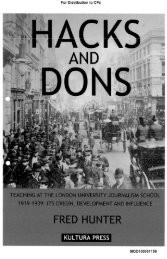The Edi ' - The Leveson Inquiry
The Edi ' - The Leveson Inquiry
The Edi ' - The Leveson Inquiry
You also want an ePaper? Increase the reach of your titles
YUMPU automatically turns print PDFs into web optimized ePapers that Google loves.
For Distribution to CPs<br />
OF D £~FA~ATIO 81 ~SE~S<br />
Publications are required by the Cede in sub-clause liv to report<br />
tairly and accurately the outcome of a case for defamation to which<br />
they had been party -- unless an agreed settlement states<br />
otherwise, or an agreed statement is published.<br />
This is intended to ensure that newspapers set the record straight<br />
m their own pages. It covers only the outcome of the case and puts<br />
no onus on editors to run ongoing reports of the action -- although<br />
they may choose to do so.<br />
A case where a man who Successfully sued <strong>The</strong> Guardian went<br />
on to complain that the paper had not run balanced reports of the<br />
trial ~Kirby an~ Co. v Th~ Guardier~: ~epclrt 46; f ~9~ was rejected<br />
by the PCC. <strong>The</strong> Code refers only to the outcome of the case.<br />
outcome of a case, believing in good faith that the settlement did not<br />
require a report of the eutcome. In its adjudication (McQueen ~nu<br />
G[vench£ S,4 v line Out ReSort #&fSII) the PIC accepted that<br />
the Code should not be used to give litigants in resolved cases<br />
further redress.<br />
Significantly, the Commission did not cansure the magazine, but<br />
urged editors and lawyers to make clear in settlements that reporting<br />
of the outcome was not an issue.<br />
<strong>The</strong> clear lessen for both sides is that agreed legal settlements ol<br />
defamation actions should include the timing and manner of any<br />
publication of the outcome and those arrangements should be<br />
enforced as part of that settlement. It should not be a matter for the<br />
PCC to referee after the event.<br />
=.ree° =tata=e.,e <strong>The</strong> p=v =oo.r ° ==r,, cases ] tote= whore =’,=, =L the It se=emen,<br />
~ biaIk~I I v ,IinlIy Ipor~ , iloort I ] 2-1- I<br />
of the defamat on act on c ear y states that there is no requirement ........ ’<br />
to pub sh the outcome or where an agreed statement Js pubtehed<br />
was added n June 2004 to protect pub cat arts wh ch reached such ......<br />
~;Icns.~ ~ ~r~.co~ & f%ilol .~:;xsr~ss ¢ReeoH 72 12¢205<br />
an agreement from being guilty ef a tachnicaI breach.<br />
That happened in !999, when a magazine did net report the<br />
?<br />
ig~ifiaa~t? Tdvial errors are no~ covered.<br />
~e, mislead{rig or distorted? A technically<br />
:~e misleading. Has a picture been manipulated?<br />
,~n to establish accuracy ahead Of Pub icatien?<br />
s? Was the complainant offered a chance to<br />
amme#t e~ conjecture and fact.’? Presentation<br />
effere~?<br />
iefamatisn case reported?<br />
A fair oDper~u~i~ for reD%y to ~nedc~rac:fe~ ~uat ~ g~n when<br />
reasonably aatted ~<br />
the Dar AI-Taqwa bookshop, as an example of the sort of premises<br />
selling titles that advocated terrorism. But the shop did not sell any<br />
of the books or DVDs featured in the article. It did sell a pamphlet<br />
that was quoted, but this did not corroborate the allegations ot<br />
ncitement to terror or hatred.<br />
<strong>The</strong> newspaper offered to publish an abridged lettar from the<br />
snap’s managing director, with an editorial footnote apelegising for<br />
.~e the Opportunity to Reply is to inaccuracies, it would be difficult<br />
any misunderstanding. But the bookshop --which had sought police<br />
~,te breach Clause 2 without first contravening the rules taid down protection, following abuse and threats to its staff -- said this was<br />
for correcting significant errors inClause 1. Complaints therefore are not enougn.<br />
rarely, if ever, considered under Clause 2 alone. But the clause is<br />
<strong>The</strong> PCC agreed, it said the misleading allegations could nave<br />
important because it sets out the precise obligation on editors. <strong>The</strong>y had extremely serious consequences in the clmate of anxiety<br />
must give a fatr opportunity to reply.., when reasonably called fo~ following the London bombings and the remedies offered were<br />
It means that where it is reasonable --as in cases of significant inadequate. <strong>The</strong> complaint of inaccuracy and failing to offer a fair<br />
naccuracy wnere little or no redress nas been offereo an epportunity to rep~y were both upheld. (Semff ~_l-A~a~* v ~’~,’e~;#~9<br />
opportunity to reply may offer a remedy beyond a simple correction. Standeftd: ~eoet? Z2 2005L<br />
Circumstances and timing can themselves add significance to an However. it would net normally be reasonable to call for an<br />
error and therefore add urgency to the need for an opportunity to opportunity to rep y if one has already been offered, especially if<br />
repty<br />
accepted. A complaint from Esther Rantzen against a Sunday<br />
A front page splash in a newspaper failed because the editor -- although disputing the<br />
Hatred For Sale Just Yards From<br />
inaccuracies -- had already published prominently a letter<br />
story n the public interest<br />
main points, <strong>The</strong> PCC decided tins was enough.<br />
<strong>The</strong> story highlighting the sale i<br />
islamic outlets was accompanied t<br />
literature in short of an absolute right of reply However i<br />
y system built on conciliation, any term<br />
<strong>The</strong> panel<br />
cotourcode<br />
~Whatthe<br />
Code sals<br />
13<br />
MOD100036588
















